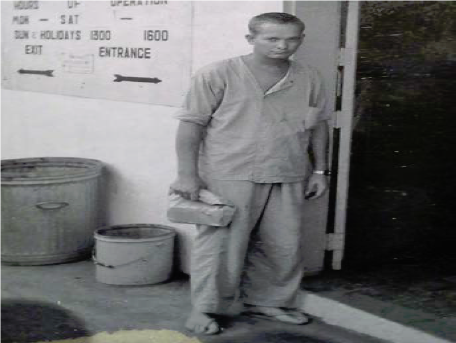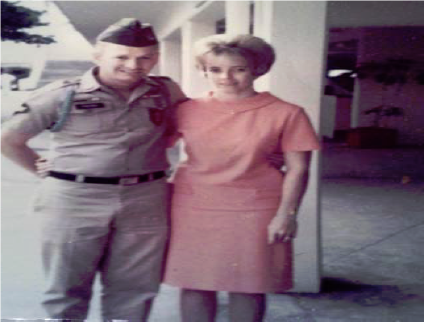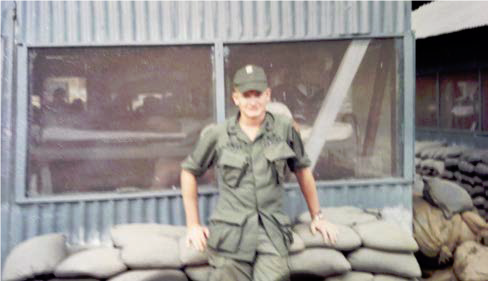Vietnam Veteran Doug Foster and the Healing Wall
- Public Affairs Chair
- Jul 25, 2019
- 4 min read
Doug Foster had heard about the Texas South Plains Honor Flight from some veterans in Snyder who had gone on the flight. Doug, a Vietnam veteran didn’t think he was eligible because he felt like it was mostly for WWII and Korean vets. He finally applied in 2014 and received the call in September 2016 that they “had a spot for him on the flight.” It would still be a difficult decision for Doug as he had never been to Washington, D.C. and wasn’t sure how he would react to the Vietnam Wall. For him, it would more difficult than most as he probably lost more buddies than anyone in the country whose names are etched on the long black wall.
Douglas Glenn Foster was born on March 9, 1943 in Roscoe, Texas to Glenn and Golda Foster. Glenn and his wife were farmers near Hermleigh, Texas and Doug would grow up doing farm work. He graduated with a class of 33 from Hermleigh High School in 1961. He would go to Texas Tech from 1961 to 1965, but regretted not finishing. He met and married Belinda December 13, 1963. He went to work at Volker Furniture & Floor Covering in Lubbock. He received his draft notice in October of 1965 but wasn’t called up until October 1966. He said he and “33 other men from the Hermleigh area were called up and sent to basic training at Ft. Bliss, Texas.” Several of these men were older and were married. He was sent to Ft. Polk, Louisiana for infantry training and would be on the list for OCS (Officer Candidate School) due to his college education. After two or three months of waiting for the school to start, he told his commanding officer to “go ahead and send me on to Vietnam.”
Doug would be assigned to the 2nd Battalion, 28th Infantry, 1st Infantry Division, the famed Big Red 1 unit, and leave from Travis, AFB on June 13, 1967 and landed in Saigon. His first assignment was to go out on night patrol. His third night out, his unit got into an ambush and three enemy were killed. Doug was an M60 Machine Gunner and was soon in charge of 3 other gunners. During one ambush, he ran out of ammunition and asked his ammo bearer, Joe B. Crutcher for more and he found out he was carrying the boxes empty for a lighter load. Not a good spot to be in. Joe B. was killed in a firefight. After several of these patrols and firefights, Doug and his unit based out of Lai Khe, were part of operation Shenandoah I and then Shenandoah II also called the Battle of Ong Thanh.
On October 16, 1967, Doug’s unit was led on point by a Viet Cong defector who was killed and a short firefight broke out as Doug saw men hit around him. He said he knew an attack was imminent as he “could always smell marijuana that the Viet Cong snipers would be smoking up in the trees.” While running for cover, Doug landed at the base of a tree and looked up just in time to see a sniper dropping a small hand grenade that the men called a “half pint”. He said that “while these grenades did damage, if it would have been an American grenade, I wouldn’t be around to tell the story.” Hit in several places by shrapnel, Doug was airlifted to the hospital in Bien Hua where he spent a week recovering. He and other wounded were then “sent to the seaside resort Vung Tao to recover from their wounds as it was felt that the sea air would help the wounds heal more quickly.” After recovering from his wounds, Doug was “reassigned to Lai Khe Base to sit at a desk and a typewriter.”
While Doug thought his combat days were over, his unit was hit by rocket fire in the initial wave of the Tet Offensive on January 30, 1968. Doug’s building was hit and the men had to “head for the bunkers.” Typewriter duty was more dangerous than he thought. He noted that the “chow hall had to be closed down as it was targeted and they had to eat c-rations for 6 weeks.”
Doug would leave Vietnam on June 14, 1968. He “came home and started farming and after the first disastrous year found a job at the Chevron Gas Plant north of Snyder in 1969 and stayed around for 25 years” until his retirement in 1995. He and Belinda continued to farm during this time and is still farming to this day with his son Rodney who was born in August 1970. Rodney didn’t know a lot about his dad’s days in Vietnam but was so proud of him for his service and his much deserved trip to Washington, D.C. that he wrote a heartfelt letter to his dad expressing his admiration.
Looking at Doug’s medals from his days in Vietnam, I noticed that he had earned the Bronze Star with a “V”. I told him I knew that the “V” stood for valor. He immediately said, “I’m no hero”. Belinda soon showed me a commendation letter that said in part, “Without hesitation or regard for his own personal safety, Specialist Foster ran through intense hostile fire to man the machinegun’s location. While engaging the Viet Cong (on his own), Specialist Foster was wounded by fragments of an enemy grenade. Ignoring his wounds, he remained at his position and continued his devastating fire to cover the evacuation of his wounded comrades.” Doug may not consider himself a hero, but as for the buddies he saved, he will always be considered one. By the time the battle was over, 59 soldiers were killed and 75 wounded.
While nearly backing out at the last minute, Doug would go on the 2016 Honor Flight. He wasn’t sure how he would react to the Vietnam Wall. He lost so many buddies there that he “didn’t have time to look them all up.” It was both an emotional and cathartic time for Doug. So many good, young men lost and he had survived. He said they call this the “Healing Wall” for many. I asked him, “was it for you?” He said “It helped but I’m still dealing with it.” He spoke for many Vietnam veterans who to this day are “still dealing with it.”
Respectfully submitted by
Larry A. Williams
Veterans Liaison Co-Chair
Texas South Plains Honor Flight Board












Comments